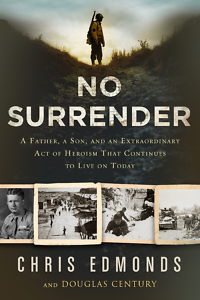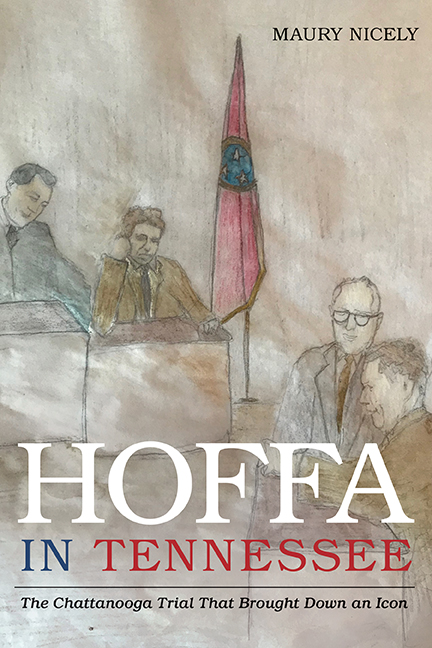Righteous Among the Nations
Tennessee native Chris Edmonds shares his father’s heroic act with the world in No Surrender
Enshrined on the Wall of Honor at Yad Vashem, Israel’s national Holocaust memorial, are the names of over 27,000 gentiles who risked their lives to save Jews during the dark days of the Third Reich. These heroes are called the Righteous Among the Nations. Among them is one American serviceman: Master Sergeant Roddie Edmonds, a Knoxville native who died in 1985 without ever telling his family about the act of courage that led to this posthumous honor. His son, Chris Edmonds, learned of his father’s heroism almost by accident and now, with co-author Douglas Century, shares Roddie’s story with the world in No Surrender: A Father, a Son, and an Extraordinary Act of Heroism That Continues to Live on Today.
 Roddie Edmonds enlisted in the army nine months before Pearl Harbor and spent the first three years of the war training infantry troops. When it came time for Roddie to lead men in combat, it was late 1944, and Germany was thought to be on the ropes, ready to surrender. Roddie’s officers in the 106th Infantry Division, writes Chris Edmonds, “were told that the men were being given an ‘easy’ posting, being sent to a sector so uneventful that GIs had nicknamed it the Ghost Front.” The line they were sent to was in the heart of the Ardennes forest.
Roddie Edmonds enlisted in the army nine months before Pearl Harbor and spent the first three years of the war training infantry troops. When it came time for Roddie to lead men in combat, it was late 1944, and Germany was thought to be on the ropes, ready to surrender. Roddie’s officers in the 106th Infantry Division, writes Chris Edmonds, “were told that the men were being given an ‘easy’ posting, being sent to a sector so uneventful that GIs had nicknamed it the Ghost Front.” The line they were sent to was in the heart of the Ardennes forest.
On the morning of December 16, 1944, the Germans crashed into the untested soldiers of the 106th, a surprise attack that became the Battle of the Bulge, one of the most brutal battles of the war. Hitler’s troops, kicked across half of Europe by Allied armies, were desperate and seeking revenge. They committed atrocities, massacring American prisoners at villages like Wereth and Malmedy. Roddie’s men, along with thousands of other U.S. troops, were ultimately forced to surrender to the still powerful and often fanatical Germans.
 As risky as it was for any American soldier to surrender during those desperate hours, it was far more dangerous for Jewish troops. By late 1944, most people knew what the Nazis were doing to Jews, though the worst horrors were yet to be uncovered. Surrendering Jews had to decide whether to throw away their dog tags and deny their religion or stand up for their beliefs and potentially be killed. “Most knew they could not risk capture with that H for Hebrew identifying them as Jews,” writes Edmonds. “Some Jewish GIs swapped dog tags with those around the necks of dead comrades.”
As risky as it was for any American soldier to surrender during those desperate hours, it was far more dangerous for Jewish troops. By late 1944, most people knew what the Nazis were doing to Jews, though the worst horrors were yet to be uncovered. Surrendering Jews had to decide whether to throw away their dog tags and deny their religion or stand up for their beliefs and potentially be killed. “Most knew they could not risk capture with that H for Hebrew identifying them as Jews,” writes Edmonds. “Some Jewish GIs swapped dog tags with those around the necks of dead comrades.”
The following weeks exposed the American prisoners to conditions even worse than combat, as the Germans marched them across icy countryside, crammed them into cattle cars, and finally marched them again to prison camps inside Germany. They were starving and freezing, and some died on the way. At the first prison camp, some Jews were separated and sent to a slave labor camp where many perished.
Arriving at Stalag IXA one afternoon near the end of January 1945, Roddie found himself senior POW and was immediately faced with a horrible choice. The Germans ordered that only Jewish soldiers report for roll call in the morning. A devout Christian, Roddie understood that his faith required him to stand by the more than 200 Jewish friends and colleagues who were imprisoned with him. He also knew, as a devoted American serviceman, that he was responsible for the safety of all his men, regardless of their religion. His decision, guided by prayer, resulted in an act of valor stunning in both its simplicity and its courage. On Roddie’s order, every American prisoner turned out for roll call — they would all stand or fall together. Even when the camp commandant put a gun to Sergeant Edmonds’ head, he refused to identify the Jewish soldiers.
In 2016, on Holocaust Remembrance Day, President Barack Obama acknowledged Roddie’s act of defiance, saying, “It’s an instructive lesson, by the way, for those of us Christians. I cannot imagine a greater expression of Christianity than to say, ‘I too am a Jew.’” No Surrender is a testament to Roddie’s faith, his patriotism, his boldness in the face of evil, and the lasting effect on the men who witnessed true courage and those who were saved by it. Passionately told by a man who wants everyone to know his father’s remarkable story, No Surrender inspires and informs as it commemorates a righteous American hero.

A Michigan native, Chris Scott is an unrepentant Yankee who arrived in Nashville more than 25 years ago and has gradually adapted to Southern ways. He is a geologist by profession and a historian by avocation.


